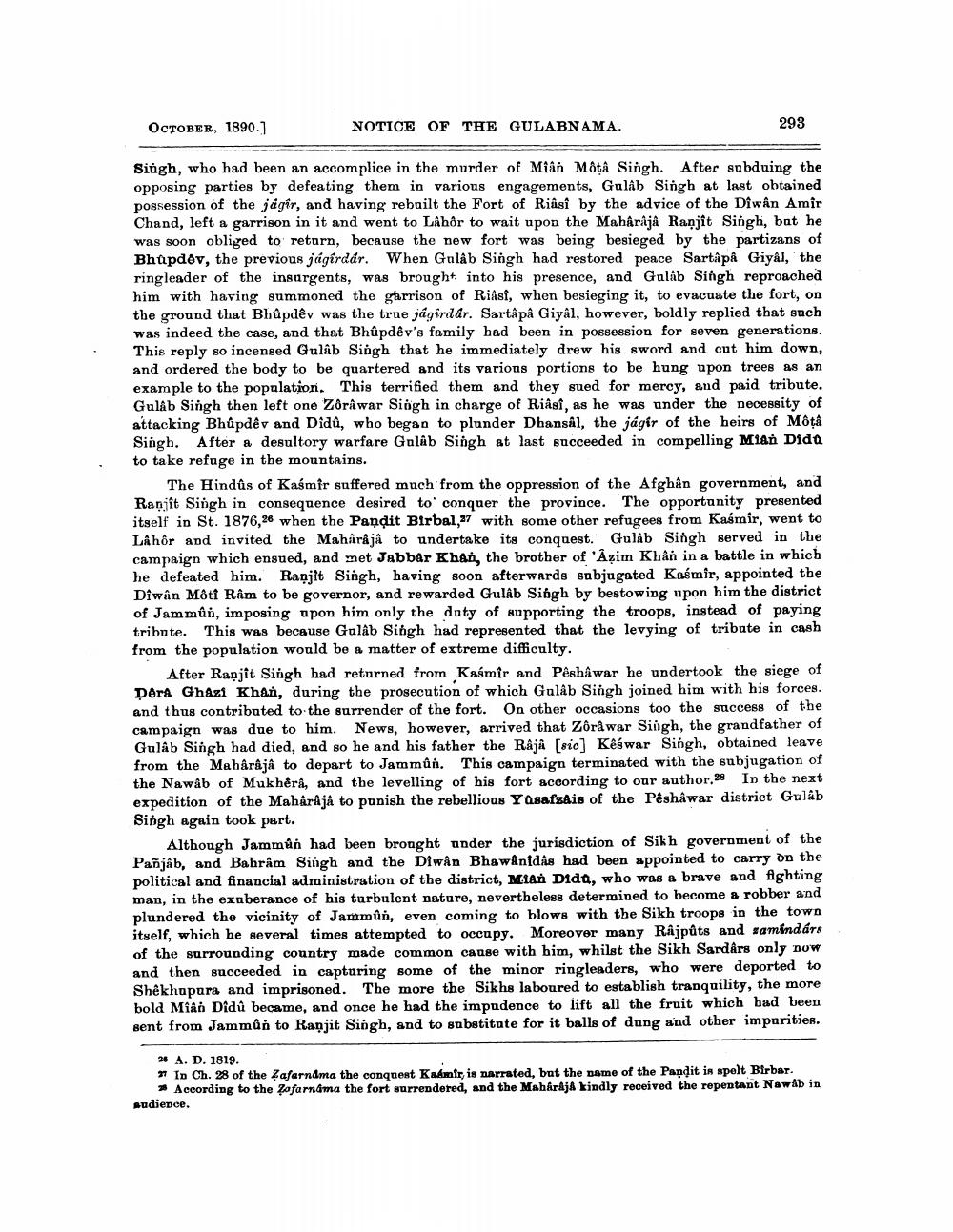________________
OCTOBER, 1890.1
NOTICE OF THE GULABNAMA.
293
Singh, who had been an accomplice in the murder of Mian Mota Singh. After subduing the opposing parties by defeating them in various engagements, Gulb Singh at last obtained possession of the jágir, and having rebuilt the Fort of Riâsî by the advice of the Diwan Amir Chand, left a garrison in it and went to LÂhôr to wait upon the Maharaja Ranjit Singh, but he was soon obliged to return, because the new fort was being besieged by the partizans of Bhupdev, the previous jágírdár. When Gulab Singh had restored peace Sartâpå Giyâl, the ring leader of the insurgents, was brought into his presence, and Gulab Singh reproached him with having summoned the garrison of Riâsî, when besieging it, to evacuate the fort, on the ground that Bhûpdêr was the true jágirdár. Sartâpå Giyâl, however, boldly replied that such was indeed the case, and that Bhûpdêv's family had been in possession for seven generations. This reply so incensed Gulab Singh that he immediately drew his sword and cut him down, and ordered the body to be quartered and its various portions to be hung upon trees as an example to the population. This terrified them and they sued for mercy, and paid tribute. Gulab Singh then left one Zôrîwar Siógh in charge of Riasi, as he was under the necessity of attacking Bhupdêr and Didů, who began to plunder Dhansal, the jágír of the heirs of Môţa Singh. After a desultory warfare Gulûb Singh at last succeeded in compelling Mian Dida to take refuge in the mountains.
The Hindûs of Kasmir suffered much from the oppression of the Afghân government, and Ranjit Singh in consequence desired to conquer the province. The opportunity presented itself in St. 1876,26 when the Pandit Birbal,27 with some other refugees from Kaśmir, went to Lahôr and invited the Maharaja to undertake its conquest. Gulb Singh served in the campaign which ensued, and met Jabbar Khan, the brother of 'Azim Khân in a battle in which he defeated him. Ranjit Singh, having soon afterwards subjugated Kaśmir, appointed the Diwân Môti Râm to be governor, and rewarded Gulab Singh by bestowing upon him the district of Jammun, imposing apon him only the duty of supporting the troops, instead of paying tribute. This was because Galâb Singh had represented that the levying of tribute in cash from the population would be a matter of extreme difficulty.
After Ranjit Singh had returned from Kaśmîr and Peshawar he undertook the siege of Dera Ghazi Khan, during the prosecution of which Gulab Singh joined him with his forces. and thus contributed to the surrender of the fort. On other occasions too the success of the campaign was due to him. News, however, arrived that Zôråwar Singh, the grandfather of Gulab Singh had died, and so he and his father the Râjâ [sic] Kêswar Singh, obtained leave from the Mahârâjâ to depart to Jammûn. This campaign terminated with the subjugation of the Nawab of Mukhera, and the levelling of his fort according to our author,28 In the next expedition of the Mahârâjâ to punish the rebellious Yusafzais of the Peshawar district Gulab Singh again took part.
Although Jamman had been brought under the jurisdiction of Sikh government of the Pañjab, and Bahram Singh and the Diwan Bhawândás had been appointed to carry on the political and financial administration of the district, Mian Dida, who was a brave and fighting man, in the exuberance of his turbulent nature, nevertheless determined to become a robber and plundered the vicinity of Jammûn, even coming to blows with the Sikh troops in the town itself, which he several times attempted to occupy. Moreover many Rajpûts and samindárs of the surrounding country made common cause with him, whilst the Sikh Sardârs only now and then succeeded in capturing some of the minor ringleaders, who were deported to Shekhapura and imprisoned. The more the Sikhs laboured to establish tranquility, the more bold Mikó Didů became, and once he had the impudence to lift all the fruit which had been sent from Jammûn to Ranjit Singh, and to substitute for it balls of dung and other impurities.
26 A. D. 1819. 77 In Ch. 28 of the Zafarndma the conquent Kasmir, is narrated, but the name of the Pandit is spelt Birbar.
According to the Lofarnama the fort surrendered, and the Maharaja kindly received the repentant Now&b in audience.




